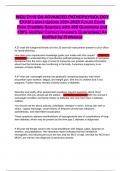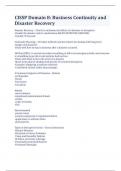WGU D115 OA ADVANCED PATHOPHYSIOLOGY
EXAM Latest Update 2024-2025 Actual Exam
from Credible Sources with 400 Questions and
100% Verified Correct Answers Guaranteed A+
Verified by Professor
A 27-year-old nulligravid female and her 25-year-old male partner present to your office
for family planning.
How does your reproductive knowledge guide your intake with this couple? - CORRECT
ANSWER: An understanding of reproductive pathophysiology is necessary to recognize
deviations from the norm. Age of onset of menarche can provide valuable information
about how the hormones are functioning in the body. A previous pregnancy is an
indicator of future fertility.
A 47-year-old, overweight woman has gradually increasing dyspnea, mild chest
discomfort upon exertion, fatigue, and weight gain. She has no children and is not
pregnant. Further history reveals a family history of diabetes.
Describe and justify other assessment questions, beyond questions about chest
discomfort, that you should ask the patient. - CORRECT ANSWER: With the woman's
overweight condition and family history of diabetes, she may have type 2 diabetes
mellitus.
You should ask her about polyuria, polydipsia, changes in vision, itching skin rash or
ulcers, vaginal discharge, recent history of frequent urinary tract infections,
paresthesias, and intermittent claudication.
These questions address manifestations of hyperglycemia and of complications of long-
term diabetes, which may be present by the time type 2 diabetes is diagnosed.
A 56-year-old female came to the nurse practitioner with fatigue, pallor, dyspnea on
exertion, and palpitations. Her laboratory report indicates that her hematocrit,
hemoglobin, and reticulocyte count are low, that her MCV is high, and that her MCH and
MCHC are normal. Her diagnosis is pernicious anemia.
,Briefly explain why the nurse practitioner should ask the patient about her paresthesias
and ataxia. - CORRECT ANSWER: Without the presence of intrinsic factor, vitamin B12
will not be absorbed effectively from the gastrointestinal tract.
A 62-year-old female comes to the emergency department with mild respiratory distress,
increasing dyspnea, orthopnea, bilateral ankle edema, and sudden weight gain. She
states that she has had severe hypertension for many years and that she has been
unable to afford her antihypertensive medication for the past several months.
Explain why you should ask the patient if she has had any recent episodes of chest pain
or any history of angina or heart attack. - CORRECT ANSWER: Hypertension is a risk
factor for coronary atherosclerosis. It also increases afterload and causes ventricular
hypertrophy, both of which increase myocardial oxygen demand.
A family is concerned that their elderly family member is not eating.
Which three education topics should be addressed with the family regarding anorexia of
the elderly? - CORRECT ANSWER: With aging, decreased saliva affects both taste and
swallowing, often leading to anorexia. Additionally, anorexia of aging is common, and
family members need to understand this. Offering oral care guidance and suggesting
foods that taste good to the patient and are easy to chew with the teeth or dentures may
be effective interventions. Furthermore, social stimulation has been shown to be
effective in elderly patients with anorexia, providing relaxation and enjoyment during
food intake.
A female patient has been diagnosed with an uncomplicated urinary tract infection
(UTI).
Which self-care measure that is specific to this type of infection should the healthcare
provider teach the patient? - CORRECT ANSWER: Wiping front to back helps prevent
the spread of e. coli into the urinary meatus. E. coli is normally colonized in the bowel
and is the most common pathogen in UTIs.
A healthcare professional is assessing a patient who could have either pyelonephritis or
cystitis.
Which differentiating sign would assist the professional in making this diagnosis? -
CORRECT ANSWER: Urinalysis confirmation of white blood cell casts
,When the kidney is inflamed, it causes damage that results in the production of white
blood cell (WBC) casts.
A healthcare professional is conducting community education on vaccinations.
Which statement about vaccines should the professional include in the presentation? -
CORRECT ANSWER: Vaccines require booster injections to maintain life-long
protection.
Most vaccines require a booster to increase immunity. The initial effects of a vaccine
may diminish over time, and boosters improve protection against disease.
A healthcare professional is educating a community men's group on symptoms of
benign prostatic hyperplasia (BPH).
Which pathophysiological condition causes most of the symptoms of BPH? - CORRECT
ANSWER: Compression of the urethra- The prostate grows and compresses the
urethra, causing most of the symptoms of BPH.
A healthcare professional is educating a community men's group on symptoms of
benign prostatic hyperplasia (BPH).
Which pathophysiological condition causes most of the symptoms of BPH? - CORRECT
ANSWER: The prostate grows and compresses the urethra, causing most of the
symptoms of BPH.
A male infant has been diagnosed with intussusception, and the student asks the
healthcare professional to explain the condition.
Which explanation by the professional is most accurate? - CORRECT ANSWER: An
intussusception is where one part of the intestine telescopes into another section of the
intestine. Intussusception's cause is typically idiopathic but can be linked to some
viruses that cause swelling in the intestines and is often seen in the fall and winter.
Intussusception most commonly affects male children from 3-36 months of age.
A male patient presents with sinus congestion, clear nasal discharge, and a cough that
is worse when he is reclined.
, What is the probable condition causing these symptoms? - CORRECT ANSWER:
Allergic rhinitis is marked by sinus congestion, clear nasal discharge, post nasal drip
that causes a sore throat, and cough that is worse when supine.
A newborn child has a solitary purplish lesion on the head that looks like a spongy
mass.
Which diagnosis is supported by this type of lesion? - CORRECT ANSWER: A
cavernous hemangioma is a benign purple vascular tumor consisting of a collection of
blood vessels that form a lesion.
A patient expresses concern to an advanced practice registered nurse (APRN) about
not being able to complete an entire meal without experiencing acid reflux. The patient
also reports new symptoms including chest pain and dysphagia. The APRN suspects
that the patient might have cancer.
Which type of cancer is the APRN concerned about? - CORRECT ANSWER: The most
common symptom of esophageal cancer is a problem swallowing (dysphagia), with a
feeling like the food is stuck in the throat or chest or even choking on food. Some
people get a feeling of pressure or burning in the chest.
A patient has a hernial protrusion of a sac-like cyst containing meninges, spinal fluid,
and a portion of the spinal cord through a deficit in the spinal column.
Which condition does this describe? - CORRECT ANSWER: Myelomeningocele is a
type of spina bifida, a neural tube defect, which is rarely covered by skin and protrudes
from the back exposing spinal cord tissue.
A patient has localized and has intense abdominal pain that lateralizes. In order to move
forward with your assessment, you consider the types of pain.
Which type of pain is this patient most likely experiencing? - CORRECT ANSWER:
Parietal pain is caused by a stimulus in the parietal peritoneum. The nerves in the
parietal peritoneum are made up of A-delta fibers. These fibers travel to the spinal cord
and correspond with the skin dermatomes T6 and L1. This produces localized and
intense pain that lateralizes because the parietal peritoneum is innervated from only one
side of the nervous system at a time.
A patient has pulmonary edema.





